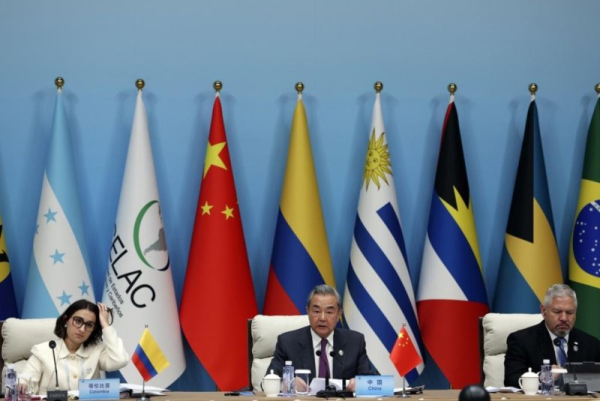

Chinese Foreign Minister Wang Yi (C), Colombia Foreign Minister Laura Sarabia (L) and Honduras Foreign Minister Eduardo Enrique Reina attend the plenary session of the China-CELAC Forum ministerial meeting in Beijing in May. File Photo by Florence Lo/Pool/EPA
With more than $14.7 billion invested in Latin America and the Caribbean in 2024 and at least $9 billion in new credit lines announced this year, China is solidifying its role as one of the region’s leading economic players.
The growth of Chinese investment in Latin America has not only transformed infrastructure, trade and technological presence in the region. but It is also quietly reshaping the foundations of Latin American economic integration, experts and former leaders warned at the “Latin America in the New Global Geopolitics” forum, organized by the Latin American Presidential Mission in Costa Rica.
Evan Ellis, a U.S. research professor of Latin American studies at the U.S. Army War College Strategic Studies Institute, said China’s presence has created a form of functional but highly fragmented integration.
“China connects the dots that matter to its interests, not the ones our countries need to develop or integrate with one another,” he said.
Projects like transoceanic corridors, logistics routes and large-scale port construction are often framed as efforts to boost regional connectivity. In practice, however, many are designed to move raw materials to Asia rather than build a cohesive Latin American market.
“It’s integration with a Chinese purpose, not a Latin American one,” Ellis said.
While China has retrenched from mega-infrastructure projects of the last decade, it has surged in backing diversified, tech-related investments, such as electric vehicles, lithium mining and cloud infrastructure.
Beijing’s strategy has been clear: engage through low-institutional forums such as CELAC, where countries do not act as a unified bloc. That weakens efforts to negotiate common standards and gives China a stronger hand in bilateral agreements.
“It’s not just about infrastructure. It’s about how Latin America’s ability to think strategically as a region is being undermined,” Ellis said.
Former Costa Rican President Laura Chinchilla echoed that concern. She said China’s expanding footprint, rather than fostering cohesion, has exacerbated historic divisions between the region’s subgroups.
“The north tends to align with the United States, the south with China. And in the middle, we’ve failed to build a shared vision for development,” Chinchilla said.
One of the most sensitive issues in this realignment is the geopolitical pressure China exerts to isolate Taiwan. Only 12 countries in the world currently maintain diplomatic ties with the island — seven of them in Latin America and the Caribbean, including Paraguay.
Former Paraguayan Vice President Luis Alberto Castiglioni firmly defended his country’s decision to maintain relations with Taipei.
“Our alliance with Taiwan is not based on conditions, but on transparent cooperation and shared democratic values. China demands that we break that relationship as a condition to access its market, and that is unacceptable.”
Ellis reinforced that view, noting that Beijing’s diplomatic and commercial pressure also has consequences for national sovereignty.
“The region should ask whether opening up to Chinese investment justifies giving up decision-making authority, regulatory standards or strategic alliances that have historically been beneficial,” he said.
Costa Rica, which cut diplomatic ties with Taiwan in 2007, has been cited as an example of institutional resistance to conditions imposed by Chinese companies. Several infrastructure projects were halted due to local legal and technical oversight.
Still, the trade balance is revealing: Costa Rica’s exports to China are now nearly 10 times smaller than those to the United States.
In light of that, former presidents at the forum agreed on the urgent need for Latin America to regain control over its own integration agenda. “This isn’t about saying no to China,” Chinchilla said, “but about setting our own rules of the game, as a region, with vision and leadership.”